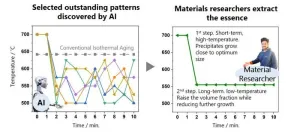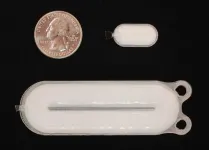(Press-News.org) A new study by Tulane University has uncovered a previously unknown molecular pathway that could be instrumental to halting lung cancer in its tracks.
Lung cancer is one of the most common cancers and the leading cause of cancer-related deaths in the world. The research, published in the journal Proceedings of the National Academy of Sciences, could lead to the development of a new anti-cancer drug and more personalized lung cancer treatment, said senior study author Dr. Hua Lu, the Reynolds and Ryan Families Chair in Translational Cancer at the Tulane University School of Medicine.
The study found that a known tumor suppressor protein called RBM10 can inhibit lung cancer growth by suppressing the function of c-Myc, a protein that drives cancer cell growth and proliferation when overexpressed. Researchers discovered that RBM10 partners with two ribosomal proteins (RPL5 and RPL11) to destabilize c-Myc and impede the spread of lung cancer.
These findings are the first to identify a cancer-inhibiting relationship between the proteins.
“We found that RBM10 can directly target c-Myc for degradation and reduce its cancer-causing effects by binding with RPL5 and RPL11,” Lu said. “We know a lot about cancer, but the molecules involved are still a black box. Piece by piece, we are gaining a better understanding.”
To understand how the process may work to halt the progression of lung cancer, imagine two factories in a cell, each manufacturing parts for assembly into new protein machineries; c-Myc plays a regular part in this protein production process — and cellular growth in general — and humans could not live without it.
Occasionally, this manufacturing is disrupted, and the factories begin producing incorrect parts. When cancer begins forming, it uses c-Myc to continue production, allowing these “spare parts” to accumulate and form tumors. RBM10, with the help of RPL5 and RPL11, can destabilize c-Myc and shut down tumor growth.
Importantly, the research also discovered that a mutant form of RBM10 often found in lung cancers loses the ability to suppress c-Myc, fails to bind to the RPL5 and RPL11 ribosomal proteins, and eventually promotes tumor growth instead of suppressing it.
“RBM10 is an important protein that can suppress cancer cells, but when a cancer wants to develop, it will mutate RBM10 and block that function,” Lu said.
Lu hopes to further study how the RBM10 mutant functions in the hope of developing an anti-cancer drug to target it.
“Hopefully we can design a molecule to specifically target the mutant, since that’s a special structure not existing in the normal tissue,” Lu said. “If we can convert this mutant, we can hopefully make it suppress c-Myc’s cancer-causing activity.”
END
One protein is key to the spread of lung cancer. Now, a new study has found a way to stop it
The findings could lead to the development of a new anti-cancer drug and more personalized lung cancer treatment.
2023-11-27
ELSE PRESS RELEASES FROM THIS DATE:
Study: Spike in premature births caused by COVID, halted by vaccines
2023-11-27
MADISON, Wis. — COVID-19 caused an alarming surge in premature births, but vaccines were key to returning the early birth rate to pre-pandemic levels, according to a new analysis of California birth records.
“The effect of maternal COVID infection from the onset of the pandemic into 2023 is large, increasing the risk of preterm births over that time by 1.2 percentage points,” says Jenna Nobles, a University of Wisconsin–Madison sociology professor. “To move the needle on preterm birth that much is akin to a disastrous ...
Why does puberty trigger us to stop growing?
2023-11-27
All animals start out as a single-celled organism and then start growing. At some point, of course, they need to stop getting bigger, but the process by which this happens is poorly understood.
New research from Alexander Shingleton at the University of Illinois Chicago and colleagues identifies a potential trigger that makes fruit flies stop growing, which has implications for understanding human development. The research is published in the Proceedings of the National Academy of Sciences.
In humans, the body’s signal to stop growing happens around puberty, though it takes several more years before growth actually ceases. It is important to better ...
Maternal vaccination against COVID-19 lowered risk of preterm births, Stanford study finds
2023-11-27
During the first two years of the pandemic, a COVID-19 infection during pregnancy increased the risk of preterm birth and NICU hospitalizations. However, by 2022, when COVID-19 vaccines were readily available in the United States, this effect disappeared – suggesting that vaccination against the coronavirus may have prevented thousands of preterm births, according to a new study led by Stanford sociologist Florencia Torche.
The study’s findings, published Nov. 27 in the journal Proceedings of the National ...
UCF receives $1.5million NSF grant to improve energy efficiency of wireless communications
2023-11-27
Wireless devices consume more than just the hours users spend scrolling through social media, streaming podcasts and TV shows, and playing games. The networks used to connect these devices also consume a large amount of energy – up to a few thousand terawatt-hours annually worldwide, which is enough to power 70,000,000 homes for one year.
UCF researcher Kenle Chen aims to enhance the energy efficiency of these systems with the support of a $1.5 million grant from the National Science Foundation’s Addressing Systems Challenges through Engineering ...
No IKAROS, no antibodies
2023-11-27
A cell nucleus is a busy place. Cellular proteins twist and pull DNA, folding the genome into intricate 3D structures that support functioning of its coding parts.
This choreography is essential for cell development, and the exact steps vary wildly between cell types. Establishing proper communication between genes and far-away control switches at the right time in the right cell is not a small feat. In fact, very few proteins have the right combination of features to organize the genome into the right structures.
In ...
New framework for using AI in health care considers medical knowledge, practices, procedures, values
2023-11-27
Health care organizations are looking to artificial intelligence (AI) tools to improve patient care, but their translation into clinical settings has been inconsistent, in part because evaluating AI in health care remains challenging. In a new article, researchers propose a framework for using AI that includes practical guidance for applying values and that incorporates not just the tool’s properties but the systems surrounding its use.
The article was written by researchers at Carnegie Mellon University, The Hospital for Sick Children, the Dalla Lana School of Public Health, Columbia University, and the University of Toronto. It is published in Patterns.
“Regulatory ...
Increasing high-temperature strength of materials through collaborative efforts of AI and materials researchers
2023-11-27
1. A materials research team consisting of NIMS and Nagoya University has designed a novel two-step thermal aging schedule (i.e., non-isothermal aging or unconventional heat treatment) capable of fabricating nickel-aluminum (Ni-Al) alloys that are stronger at high temperatures than Ni-Al alloys fabricated using conventional thermal aging processes. This was achieved by using artificial intelligence (AI) techniques to identify several dozen different thermal aging schedules potentially effective in increasing alloys’ high-temperature strength. The mechanisms ...
The jigglings and wigglings of atoms reveal key aspects of COVID-19 virulence evolution
2023-11-27
Auburn, AL – Richard Feynman famously stated, “Everything that living things do can be understood in terms of the jigglings and wigglings of atoms.” This week, Nature Nanotechnology features a groundbreaking study that sheds new light on the evolution of the coronavirus and its variants of concern by analyzing the behavior of atoms in the proteins at the interface between the virus and humans. The paper, titled “Single-molecule force stability of the SARS-CoV-2–ACE2 interface in variants-of-concern,” is the result of an international collaborative ...
UCF receives 3 minority serving institution awards to promote collaborations with NASA
2023-11-27
ORLANDO, Nov. 27, 2023 – Three research projects from the University of Central Florida have been selected for NASA Minority University Research and Education Project Partnership Annual Notification (MPLAN) awards. The grants, worth up to $50,000 each, are designed to connect and promote research collaborations between Minority Serving Institutions and NASA Mission Directorates.
A total of 18 projects received Phase I funding across 15 universities. UCF received the most awards, with all three housed within the College of Engineering and Computer Science. Dean Michael Georgiopoulos ...
Stem cell-based treatment controls blood sugar in people with Type 1 diabetes
2023-11-27
An innovative stem cell-based treatment for Type 1 diabetes can meaningfully regulate blood glucose levels and reduce dependence on daily insulin injections, according to new clinical trial results from the University of British Columbia (UBC) and Vancouver Coastal Health (VCH).
“This is a significant step toward a functional cure for Type 1 diabetes,” said Dr. David Thompson, principal investigator at the Vancouver trial site, clinical professor of endocrinology at UBC and director of the Vancouver General Hospital Diabetes Centre. ...
LAST 30 PRESS RELEASES:
Magnetic resonance imaging opens the door to better treatments for underdiagnosed atypical Parkinsonisms
National poll finds gaps in community preparedness for teen cardiac emergencies
One strategy to block both drug-resistant bacteria and influenza: new broad-spectrum infection prevention approach validated
Survey: 3 in 4 skip physical therapy homework, stunting progress
College students who spend hours on social media are more likely to be lonely – national US study
Evidence behind intermittent fasting for weight loss fails to match hype
How AI tools like DeepSeek are transforming emotional and mental health care of Chinese youth
Study finds link between sugary drinks and anxiety in young people
Scientists show how to predict world’s deadly scorpion hotspots
ASU researchers to lead AAAS panel on water insecurity in the United States
ASU professor Anne Stone to present at AAAS Conference in Phoenix on ancient origins of modern disease
Proposals for exploring viruses and skin as the next experimental quantum frontiers share US$30,000 science award
ASU researchers showcase scalable tech solutions for older adults living alone with cognitive decline at AAAS 2026
Scientists identify smooth regional trends in fruit fly survival strategies
Antipathy toward snakes? Your parents likely talked you into that at an early age
Sylvester Cancer Tip Sheet for Feb. 2026
Online exposure to medical misinformation concentrated among older adults
Telehealth improves access to genetic services for adult survivors of childhood cancers
Outdated mortality benchmarks risk missing early signs of famine and delay recognizing mass starvation
Newly discovered bacterium converts carbon dioxide into chemicals using electricity
Flipping and reversing mini-proteins could improve disease treatment
Scientists reveal major hidden source of atmospheric nitrogen pollution in fragile lake basin
Biochar emerges as a powerful tool for soil carbon neutrality and climate mitigation
Tiny cell messengers show big promise for safer protein and gene delivery
AMS releases statement regarding the decision to rescind EPA’s 2009 Endangerment Finding
Parents’ alcohol and drug use influences their children’s consumption, research shows
Modular assembly of chiral nitrogen-bridged rings achieved by palladium-catalyzed diastereoselective and enantioselective cascade cyclization reactions
Promoting civic engagement
AMS Science Preview: Hurricane slowdown, school snow days
Deforestation in the Amazon raises the surface temperature by 3 °C during the dry season
[Press-News.org] One protein is key to the spread of lung cancer. Now, a new study has found a way to stop itThe findings could lead to the development of a new anti-cancer drug and more personalized lung cancer treatment.



